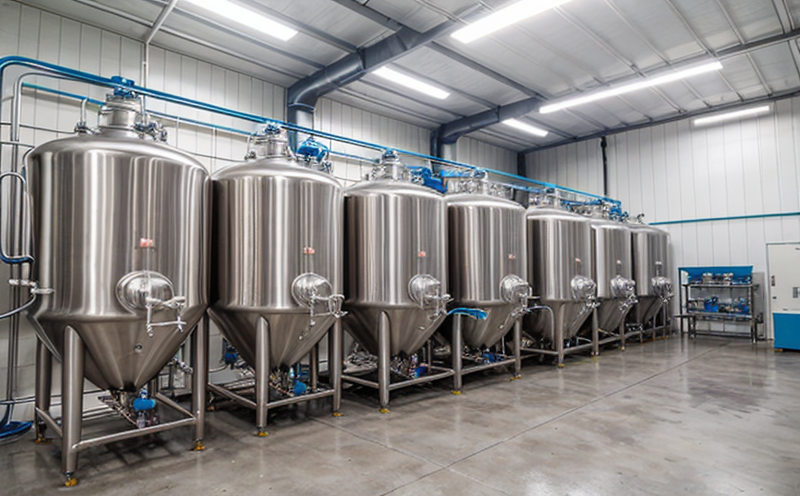WHO Biosafety Testing in Industrial Biotechnology Facilities
The World Health Organization (WHO) biosafety testing is a critical component of ensuring safety and regulatory compliance in industrial biotechnology facilities. This service focuses on the rigorous testing required to meet WHO guidelines, which are essential for safeguarding human health and the environment during the production of biological products.
Industrial fermentation processes often involve handling hazardous materials that can pose significant risks if not properly managed. By adhering to WHO biosafety standards, facilities can prevent accidents, protect workers, and comply with stringent international regulations. This service ensures that all aspects related to biotechnology are tested comprehensively for safety, efficacy, and regulatory compliance.
The testing process involves several stages, including sample collection from various points within the facility, preparation, and analysis using advanced laboratory techniques. These tests are designed to detect potential hazards such as allergens, pathogens, and other harmful substances that could contaminate products or cause adverse effects on workers.
WHO biosafety testing is particularly important for facilities producing biopharmaceuticals, vaccines, enzymes, and other biological agents. It ensures that these products are safe for use while also protecting the environment from unintended releases of genetically modified organisms (GMOs). The service covers a wide range of tests, including but not limited to:
- Pathogen identification
- Allergen detection
- Genetic stability assessment
- Toxicity evaluation
- Viral vector characterization
- Biocontainment level validation
The testing methodology is based on international standards such as ISO 17025 for proficiency and quality assurance, ensuring that the results are reliable and repeatable. Compliance with these standards provides confidence in the safety of products derived from biotechnology.
| Standard | Description |
|---|---|
| ISO 17025 | International standard for proficiency and quality assurance in testing laboratories. |
| WHO Biosafety Guidelines | Pertinent guidelines ensuring safety, health, and environmental protection during biotechnology operations. |
| EN ISO 15194 | European standard for the classification of biohazards in laboratories. |
The testing process begins with a comprehensive assessment of the facility's operational procedures and potential risks. This includes identifying all biological materials used, evaluating the containment levels required, and determining appropriate sampling strategies. Samples are then collected from relevant areas such as fermentation tanks, storage units, packaging lines, and waste management systems.
Once collected, samples undergo rigorous analysis using cutting-edge laboratory equipment. Techniques employed may include molecular biology methods like PCR (Polymerase Chain Reaction), next-generation sequencing, and other advanced analytical tools tailored to the specific requirements of each facility. The results are meticulously documented and reviewed by our experienced scientists who ensure full compliance with WHO guidelines.
The final report includes detailed information on all detected organisms or substances along with their concentrations levels. Compliance certificates are issued upon successful completion of all required tests, providing peace of mind to management teams responsible for maintaining high standards within their facilities.
By partnering with Eurolab for WHO biosafety testing in industrial biotechnology facilities, you can rest assured that your operations meet the highest levels of safety and regulatory compliance. Our team of experts ensures that every aspect of your facility's biological processes is thoroughly evaluated, safeguarding both human health and the environment.
Applied Standards
| Standard | Description |
|---|---|
| ISO 17025 | International standard for proficiency and quality assurance in testing laboratories. |
| WHO Biosafety Guidelines | Pertinent guidelines ensuring safety, health, and environmental protection during biotechnology operations. |
| EN ISO 15194 | European standard for the classification of biohazards in laboratories. |
Benefits
- Ensures compliance with WHO biosafety guidelines and international standards
- Reduces the risk of accidental contamination or release of hazardous materials
- Promotes a safer working environment for all personnel involved in biotechnology processes
- Aids in maintaining regulatory approval for your products
- Provides detailed reports on detected organisms and concentrations levels, aiding process optimization
- Safeguards the reputation of your facility by ensuring consistent high standards in safety practices
Eurolab Advantages
Partnering with Eurolab for WHO biosafety testing offers several advantages that set us apart from other service providers:
- Experienced team of experts specializing in biotechnology and industrial microbiology
- State-of-the-art laboratory facilities equipped with the latest analytical instruments
- Dedicated focus on ensuring accurate, reliable results through strict quality control measures
- Comprehensive approach covering all aspects of biosafety testing as per WHO guidelines
- Prompt delivery of detailed reports and certificates upon successful completion of tests
- Support during the entire process from initial consultation to final report generation





